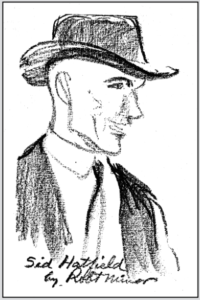 —————
—————
Hellraisers Journal – Monday July 28, 1902
Parkersburg, West Virginia – Judge Jackson re “Organizers” and “Agitators”
From The Pittsburg Press of July 24, 1902:
JUDGE WAS SEVERE ON MINERS
[…]
Parkersburg, W. Va., July 24.-There was the most intense interest in the crowded room of the United States District Court this morning when Judge Jackson began reading his lengthy decision declaring “Mother” Mary Jones, the angel of the miners, and seven other organizers of the United Mine Workers and four Hungarians to be guilty of contempt of disregarding his injunction of June 19, against holding a meeting or creating a demonstration at or near the Pinnickinnick mine of the Clarksburg Fuel Co., or near the residence of miners at work. Judge Jackson, after concluding his decision, sentenced the defendants as follows:
Thomas Haggerty, 90 days in jail; Wm. Morgan, Bernard Rice, Peter Wilson, Wm. Blakeley, George Bacon, Thomas Laskavish, 60 days each. “Mother” Jones’ sentence was passed till afternoon. It is said she will receive a stiff fine and will not be jailed. Albert Repake, Joseph and George Roeski and Steve Teonike, Hungarians, passed until the afternoon session……
[Photograph and emphasis added.]
Ruling of Judge Jackson, July 24, 1902:
UNITED STATES ex rel. GUARANTY TRUST CO. of NEW YORK
v. HAGGERTY et al.
(Circuit Court, N. D. West Virginia. July 24, 1902.)[Part I of II]
1. INJUNCTION.—GROUNDS—COMBINATION TO INDUCE STRIKES.
The power of a court of equity may be invoked to restrain and inhibit by injunction a combination which is formed to induce employes who are not dissatisfied with the terms of their employment to strike for the purpose of inflicting injury and damage upon the employers.
2. SAME.
While employes have the right to quit their employment whenever they desire, unless contractual relations exist between them and their employers which should control such right, the action of third persons, having no interest in the contracts between workmen and their employers, in conspiring to control the action of the workmen and to induce them to strike by means of threats, intimidation, or a resort to any other modes usually employed in such cases, is an illegal and malicious interference with the employer’s business, which a court of equity may properly enjoin where it is necessary to prevent irreparable injury.
3. SAME—Violation—CONTEMPT OF COURT.
Defendants, who were alleged to be unlawfully interfering with the business of a coal company and its employes by attempting to incite the latter to strike, were enjoined from assembling together, in camp or otherwise, at or near the mines of the company, or at or so near the residences of its employes, as to disturb, alarm, or intimidate such employes, so as to prevent them from working in the mines, or to prevent or interfere with them in passing to or from their work at the mines, or in otherwise interfering with them as the employes of the company.
After being served with the injunction, defendants assembled and held an open-air meeting within 1,000 feet from the opening of the mine, and within 300 to 400 feet from the residences of the miners, and in plain view of both. It was also near where the miners were obliged to pass in going to and from their work, and 150 feet from the company’s property. At such meeting violent speeches were made by defendants, in which they stated that the injunction did not amount to anything, and would not stop them; that, if they were arrested, others would take their places; and they criticised the court for granting an injunction, stating that the judge was a tool of the company, and no attention should be paid to his order, but that the miners should be made to lay down their tools and come out. It was shown that such meeting disturbed the miners, who were afraid of violence, and that the works would be blown up; that they had no disagreement with their employer, and a large majority of them did not desire to strike, but many said they would quit work unless they could be protected.
Held, that such action by defendants was a violation of the injunction, and a contempt of court.

 ———-
———-

 ————
———— Williamson, W. Va., Feb. 5.-This has been a day of speculation and rumors and of desperate struggle on the part of everyone, except Sid Hatfield and the 20 others on trial for the Matewan murders, to be reasonably cheerful and comfortable. Court adjourned before noon today without having added to the jury panel and left all of those in attendance upon the case with nothing to do except talk and wander about muddy streets in a dismal rain, with bare, scarred, cut-over hills rising at one’s elbows, it seemed, to press down the gloom.
Williamson, W. Va., Feb. 5.-This has been a day of speculation and rumors and of desperate struggle on the part of everyone, except Sid Hatfield and the 20 others on trial for the Matewan murders, to be reasonably cheerful and comfortable. Court adjourned before noon today without having added to the jury panel and left all of those in attendance upon the case with nothing to do except talk and wander about muddy streets in a dismal rain, with bare, scarred, cut-over hills rising at one’s elbows, it seemed, to press down the gloom.